学八年级英语下册Unit5Whatwereyoudoingwhentherainstormcame综合测试试题(新版)人教新目标版
- 格式:doc
- 大小:155.01 KB
- 文档页数:4

Unit 5 What were you doing when the rainstorm came?第1课时Section A(1a~2d)(一)自主学习1.自学生词,并记住拼读及拼写。
根据句意及汉语提示完成单词。
(1)He was having an English class when the __rainstorm__(暴风雨) came.(2)__Suddenly__(突然地),the car ran into the river and everyone was surprised.(3)The __alarm__(闹钟) is used to wake me up every morning.(4)She heard a __strange__(奇怪的) sound when I was sitting in the bedroom.2.预习课本,找出重点短语及句子。
(1)(闹钟)发出响声__go__off__(2)等候__wait__for__(3)洗澡__take__a__shower__(4)醒来__wake__up__(5)暴风雨来时你正在做什么?What __were__ you __doing__ when the heavy rain __came__?(6)那时,我正在厨房里帮助妈妈。
I __was__ in the __kitchen__ __helping__ my mom at that time.(二)课堂导学Step 1情景导入The teacher points at a student in the classroom and has a conversation with him.T:Where are you?S1:I am in the classroom.T:What are you doing?S1:I am answering your questions.The teacher writes“What are you doing?”on the blackboard and asks in Chinese:这是什么时态?引导学生回复,复习现在进行时态的意义及结构。
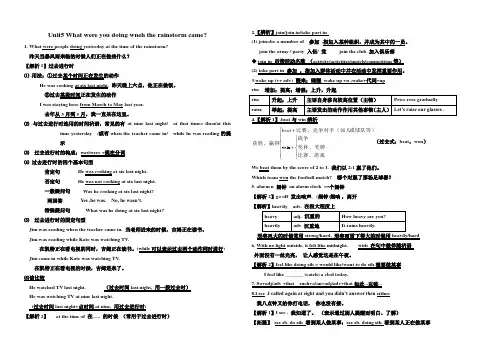
Unit5 What were you doing wneh the rainstorm came?1.What were people doing yesterday at the time of the rainstorm?昨天当暴风雨来临的时候人们正在做些什么?【解析1】过去进行时⑴ .用法:①过去某个时间正在发生的动作He was cooking at six last night. 昨天晚上六点,他正在做饭。
②过去某段时间正在发生的动作I was staying here from March to May last year.去年从3月到5月,我一直呆在这里。
⑵ .与过去进行时连用的时间状语,常见的有at nine last night/ at that time= then/at thistime yesterday /或有when the teacher came in/ while he was reading的提示⑶过去进行时的构成:was\were +现在分词⑷过去进行时的四个基本句型肯定句He was cooking at six last night.否定句He was not cooking at six last night.一般疑问句Was he cooking at six last night?两回答Y es ,he was. No, he wasn’t.特殊疑问句What was he doing at six last night?⑸过去进行时的固定句型Jim was reading when the teacher came in. 当老师进来的时候,吉姆正在读书。
Jim was reading while Kate was watching TV.在凯特正在看电视的同时,吉姆正在读书。
(while可以表示过去两个动作同时进行) Jim came in while Kate was watching TV.在凯特正在看电视的时候,吉姆进来了。
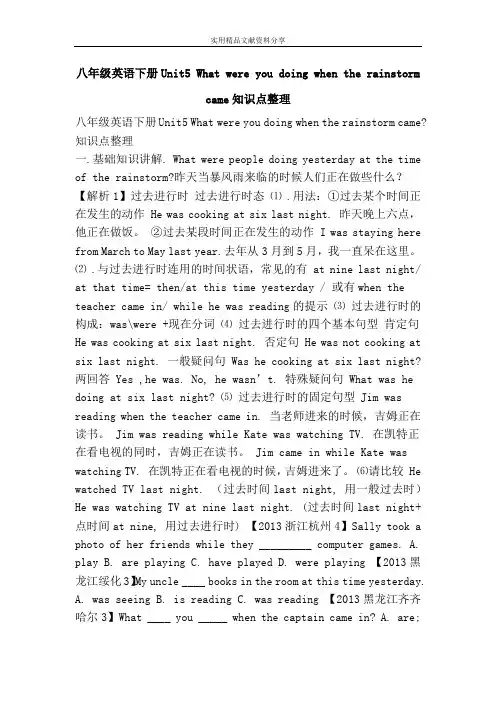
八年级英语下册Unit5 What were you doing when the rainstormcame知识点整理八年级英语下册Unit5 What were you doing when the rainstorm came?知识点整理一.基础知识讲解. What were people doing yesterday at the time of the rainstorm?昨天当暴风雨来临的时候人们正在做些什么?【解析1】过去进行时过去进行时态⑴ .用法:①过去某个时间正在发生的动作 He was cooking at six last night. 昨天晚上六点,他正在做饭。
②过去某段时间正在发生的动作 I was staying here from March to May last year.去年从3月到5月,我一直呆在这里。
⑵ .与过去进行时连用的时间状语,常见的有 at nine last night/ at that time= then/at this time yesterday / 或有when the teacher came in/ while he was reading的提示⑶ 过去进行时的构成:was\were +现在分词⑷ 过去进行时的四个基本句型肯定句He was cooking at six last night. 否定句 He was not cooking at six last night. 一般疑问句 Was he cooking at six last night? 两回答Yes ,he was. No, he wasn’t. 特殊疑问句 What was he doing at six last night? ⑸ 过去进行时的固定句型 Jim was reading when the teacher came in. 当老师进来的时候,吉姆正在读书。

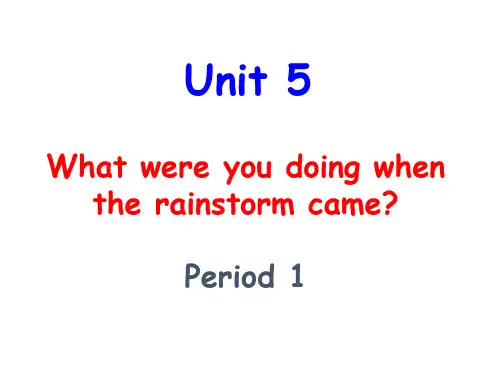
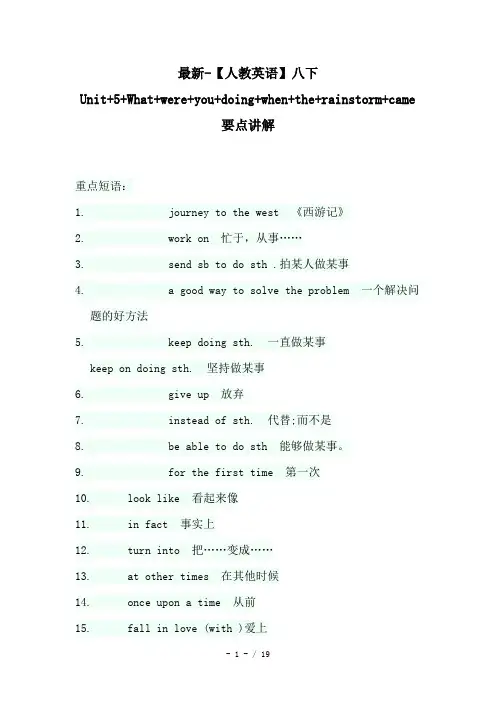
最新-【人教英语】八下Unit+5+What+were+you+doing+when+the+rainstorm+came要点讲解重点短语:1. journey to the west 《西游记》2. work on 忙于,从事……3. send sb to do sth .拍某人做某事4. a good way to solve the problem 一个解决问题的好方法5. keep doing sth. 一直做某事keep on doing sth. 坚持做某事6. give up 放弃7. instead of sth. 代替;而不是8. be able to do sth 能够做某事。
9. for the first time 第一次10. look like 看起来像11. in fact 事实上12. turn into 把……变成……13. at other times 在其他时候14. once upon a time 从前15. fall in love (with )爱上16. the weak 弱者the +形容词表示这一类人17. come out 出来;出版18. a couple of 三两个19. get married 结婚20. make himself a human 使他自己成为人21. make a plan 制定计划22. all over the world 全世界23. in the moonlight 在月光之中24. be lost/ get lost 迷失25. make up 醒来,叫醒26. find one’s way out找到出路27. lead (sb) to 把某人引向……28. be made of 由……组成(能看出原材料的)be made from 由……组成(不能看出原材料的)29. from inside 从……里面30. learn about 了解31. put on 穿上put off 推迟,扔掉,阻止区别:put on 穿上dress 穿wear 穿have on 穿be in 穿着unit 5 what were you doing when the rainstorm came?重点语法知识点:1. be + doing 进行时的标志区别:2. What were people doing yesterday at the timeof the rainstorm?过去进行时的特殊疑问句与现在进行时的特殊疑问句用法一样特殊疑问词+ 一般疑问句+ ?过去进行时的一般疑问句:将was/ were 提前,当遇到第一人称的时候,将第一人称转变成第二人称过去进行时的否定句在was/were后面加not 缩写成:wasn’t/weren’t。
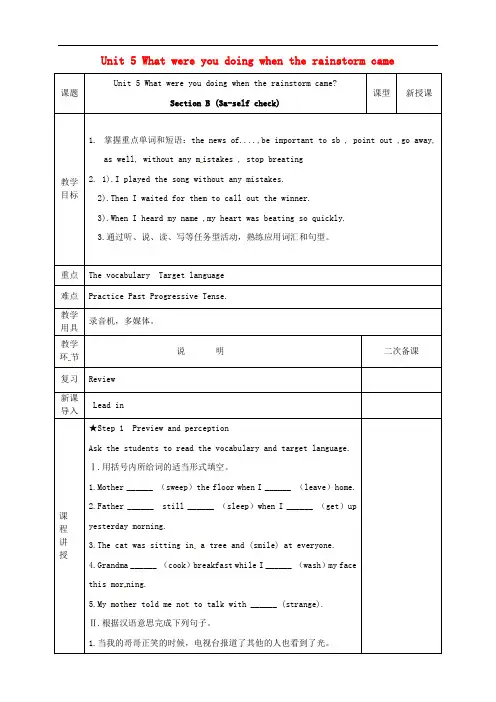
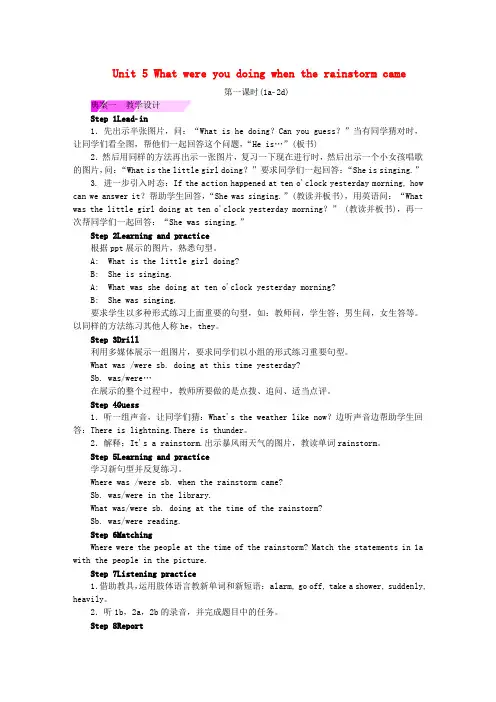
Unit 5 What were you doing when the rainstorm came第一课时(1a2d)Step 1Leadin1.先出示半张图片,问:“What is he doing?Can you guess?”当有同学猜对时,让同学们看全图,帮他们一起回答这个问题,“He is…”(板书)2.然后用同样的方法再出示一张图片,复习一下现在进行时,然后出示一个小女孩唱歌的图片,问:“What is the little girl doing?”要求同学们一起回答:“She is singing.”3. 进一步引入时态:If the action happened at ten o'clock yesterday morning, how can we answer it?帮助学生回答,“She was singing.”(教读并板书),用英语问:“What was the little girl doing at ten o'clock yesterday morning?” (教读并板书),再一次帮同学们一起回答:“She was singing.”Step 2Learning and practice根据ppt展示的图片,熟悉句型。
A: What is the little girl doing?B: She is singing.A: What was she doing at ten o'clock yesterday morning?B: She was singing.要求学生以多种形式练习上面重要的句型,如:教师问,学生答;男生问,女生答等。
以同样的方法练习其他人称he,they。
Step 3Drill利用多媒体展示一组图片,要求同学们以小组的形式练习重要句型。
What was /were sb. doing at this time yesterday?Sb. was/were…在展示的整个过程中,教师所要做的是点拨、追问、适当点评。

Unit 5 What were you doing when the rainstorm came?第一课时Section A (1a-2d)学习目标1.掌握P33—P34的单词2能正确的使用when 与at the time of引导的时间状语从句初步交谈过去进行的事。
3.学习句子:Where were you when the rainstorm came? —I was in the library.What were you doing at the time of the rainstorm? —I was studying.重难点能初步交谈过去进行的事学习了解过去进行时的构成及用法。
自主预习1.根据下列汉语提示的单词短语识记并默写。
暴风雨_____ 在….的时候_____ 走回家_____等公车_____ 做我的家庭作业_____ 去上班 _____2.仔细观察下面的对话,用“_____”标出对话中所出现的时间,并补全句子.(1)A: What are you doing now? B: I am doing my homework now. They are having an English lesson.(2)A: What were you doing at 9 o’clock last night? B: I was doing homework. C:_________________________________(我正在打扫我的房间).(3)A: What were you doing when your mother came back yesterday?B:I ______________________________________(我正在做作业).3.自学课本110页的语法知识,预习过去进行时,掌握其构成及用法4.你还记得现在分词的构成规则吗?合作探究1.过去进行时过去进行时主要表示在_____或_____进行的动作。
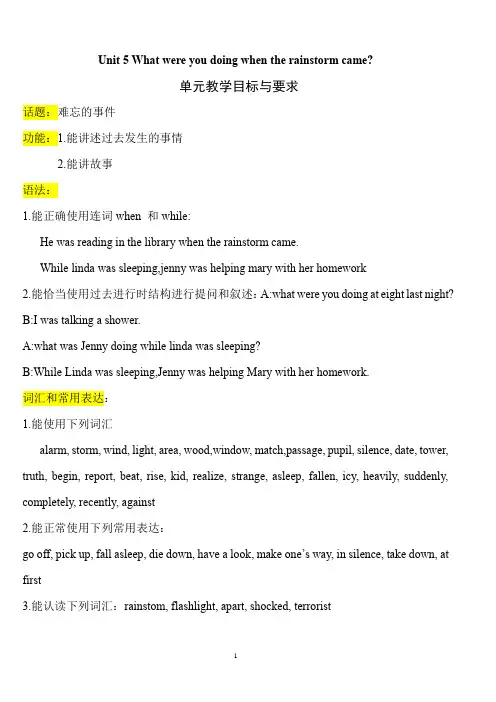
Unit 5 What were you doing when the rainstorm came?单元教学目标与要求话题:难忘的事件功能:1.能讲述过去发生的事情2.能讲故事语法:1.能正确使用连词when 和while:He was reading in the library when the rainstorm came.While linda was sleeping,jenny was helping mary with her homework2.能恰当使用过去进行时结构进行提问和叙述:A:what were you doing at eight last night? B:I was talking a shower.A:what was Jenny doing while linda was sleeping?B:While Linda was sleeping,Jenny was helping Mary with her homework.词汇和常用表达:1.能使用下列词汇alarm, storm, wind, light, area, wood,window, match,passage, pupil, silence, date, tower, truth, begin, report, beat, rise, kid, realize, strange, asleep, fallen, icy, heavily, suddenly, completely, recently, against2.能正常使用下列常用表达:go off, pick up, fall asleep, die down, have a look, make one’s way, in silence, take down, at first3.能认读下列词汇:rainstom, flashlight, apart, shocked, terrorist学习策略:通过文章插图和标题等获取文章的主旨大意,训练快速阅读的技巧文化知识:1.了解美国民权运动领袖马丁•路德•金2.了解震惊世界的9.11恐怖袭击事件。
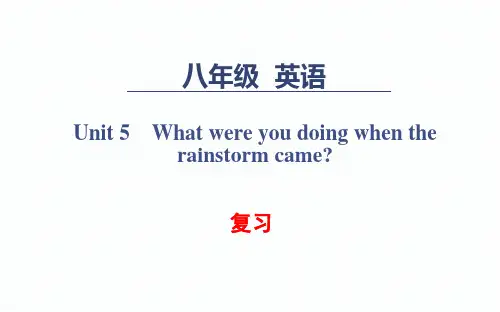
八年级英语下册优质课教案Unit 5 what were you doing when the rainstorm came?(SectionA 1a—2d)Part1. Teaching materialThis is the first period of this unit. In this lesson, students will learn some new phrases and sentences to describe the past events. They will do some speaking, listening and writing.Part2. Teaching aims1.learn some phrases and sentences.2.Improve the skills of listening.3.learn the past progressive tense and describe the past events.Part3. Difficult and important points1.master the sentences.2.how to use the past progressive tense properly.3.master the differences between the present and past progressive tense.Part4. Teaching aidsTape recorder, PPT,Part5. teaching proceduresStep1. lead-inT: Good morning, everyone! I’m glad to meet you here! You are very friendly and I hope we can make friends and have a happy class. Do you agree with me ? Now I’ll show you some pictures. Look! What are you doing ? who can answer my question? Hands up, please.S1:I am reading.T: Great! What about this picture? What are you doing ?S2:I am ……T: You all did wonderful job! You are so clever!Step2. presentationT: what’s the weather like today? What was the weather like yesterday? But yesterday there was a rainstorm in Fujian. What were they doing when the rainstorm came? Here are some reports.What were you doing when the rainstorm came?S:I was reading.T: wonderful! The next picture…(show 3 pictures to practice the past progressive tense.)T: Find the differences.Dialogue1: What are you doing?I am reading .Dialogue2:What were you doing when the rainstorm came ?I was reading .Compare the tense and the forms of the verbs. The first one uses the present progressive tense and the structure is “am/is/are + doing”. The second one uses the past progressive tense and the structure is “was/were + doing”. Read the dialogues and the grammar.T: let’s make a dialogue. Ask and answer in pairs.Where were you at 6:00 yesterday evening?What were you doing ?I’ll show you an example.Where were you at 6:00 yesterday evening?S3: I was in a river.T: what were you doing ?S3: I was swimming.T: you can do like this with your deskmate. Now ,begin.(Several minutes later, ask some pairs to show their answers.)T: You all did great! Turn to page 33 and look at the pictures in 1a. Where were the people at the time of the rainstorm? Match statements with the people in the pictures. It’s quite easy. Do it by yourself. I believe you can do it very well.(ask one to check the answers)Step3. listening and speakinga.do 1b on page 33.T: It’s time to do some listening . Listen carefully. What were they doing when the rainstorm came? Pay attention to “was/were +doing”. (check the answers)T: look here! Look at the pictures and answer the questions by using “was/were + doing”. For example, what was your sister doing at the time of the rainstorm? Who can answer my question?S: She was reading at home.T: good! The next…W ho can answer my question?S:…b.PairworkT: Pairwork. Talk about what the people in 1a were doing at the time of the rainstorm.(ask four pairs to show.)c. listening(2a,2b)T: Wonderful job! Now listen to the tape and number the pictures 1-5 on page 34. Give you 1 minute to look through these pictures and guess what the right order is. Begin .(then check the answers)T: Listen again. Fill in the blanks in the sentences in 2a. Before listening, give you 2 minutes to look through the text and guess what it is according to the pictures. (then check the answers)d. PracticeT: If you are a TV reporter, ask your deskmate some questions.What happened yesterday morning?Did you catch the bus?So, when the rainstorm suddenly came, what were you doing?…Step4. consolidationa.Read the 2d.b. follow the tape.c. read again and focus on the colorful word.d. role-play.Step5: feedbackT: Make a survey. Ask your partners in your group what they were doing at the following time. Fill in the form and then give a report.(ask two students to write on the blackboard and check.)Step6.summaryT: Have a revision. You should remember the important sentences and phrases. Who knows? Hands up, please..…Step7: homework1. Remember the words and phrases in this lesson.2. Make a dialogue using “the past progressive tense”.Step8: blackboard designUnit 5 what were you doing when the rainstorm came?(SectionA 1a—2d)A:what are you doing ? A: what were you doing whenthe rainstorm came?B:I am reading. B: I was reading.。
八年级英语下册Unit-5知识点总结Unit5-What-were-you-doing-w hen-the-rainstorm-cameUnit5 What were you doing when the rainstorm came?一.基础知识讲解.What were people doing yesterday at the time of the rainstorm?昨天当暴风雨来临的时候人们正在做些什么?【解析1】过去进行时过去进行时态⑴ .用法:①过去某个时间正在发生的动作He was cooking at six last night. 昨天晚上六点,他正在做饭。
②过去某段时间正在发生的动作I was staying here from March to May last year.去年从3月到5月,我一直呆在这里。
⑵ .与过去进行时连用的时间状语,常见的有at nine last night/ at that time= then/at this time yesterday /或有when the teacher came in/ while he was reading的提示⑶过去进行时的构成:was\were +现在分词⑷过去进行时的四个基本句型肯定句He was cooking at six lastnight.否定句He was not cooking at six last night.一般疑问句Was he cooking at six last night?两回答Yes ,he was. No, he wasn’t.特殊疑问句What was he doing at six last night?⑸过去进行时的固定句型Jim was reading when the teacher came in. 当老师进来的时候,吉姆正在读书。
Jim was reading while Kate was watching TV.在凯特正在看电视的同时,吉姆正在读书。
Unit 5 What were you doing when the rainstorm came课题Unit 5 What were you doing when the rainstorm came?Section A 1(1a2d) 课型新授课教学目标1.掌握重点单词和短语:rainstorm,ala rm,begin,heavily,suddenly,strange,at the time, go off,take a hot shower,pick up.2.掌握重点句式:1)what was the girl doing at the time of the rainstorm?she was doing her homework.2)when you called,I was taking a shower.but then I called again at nine .3.通过听、说、读、写等任务型活动,熟练应用词汇和句型。
重点1.重点短语和句型。
2.When和while的用法难点初步学习用进行时来表示过去某个时间在做什么教学用具录音机,多媒体。
教学环节说明二次备课复习Review新课导入Lead in课程讲授★Step 1 Warming upYesterday, there was a rainstorm. Where were they when the rainstorm came? Here are some repor ts.For example:A: Where were you when the rainstorm came? B: I was in the library.1a. Where were the people at the time of the rainstorm? Match the statements with the people in the picture.1. _____ I was in the library.2. _____ I was in my house.★Step 2 ListeningWhat were they doing when the rainstorm came?Let’slisten.Pay attention to “was/were doing”1b. Listen to the TV report and circle the correct response.a. doing my homework / studyingb. playing basketball /readingc. going to work / waiting for the busd. walking home /shopping2a .Listen and number the pictures 15.2b. Listen again. Fill in the blanks in the sentences in 2a. ★Step3 Speaking2c. Use the information in 2a to retell the story in aconversati on between the boy and a TV reporter.2d. Role play the conversation.★Step 4 Language points1. My alarm did n’t go off so I woke up late. alarmn. 闹钟e.g. What time shall I set the alarm for? 我该把闹钟拨到几点钟响?2. I was waiting for the bus when it began to rain heavily.1) begin v. (began) 开始e.g. I’ll begin whenever you’re ready.你什么时候准备好我就开始。
八年级英语下册Unit 5 What were you doing when the rainstorm came知识点整合(无答案)(新版)人教新目标版编辑整理:尊敬的读者朋友们:这里是精品文档编辑中心,本文档内容是由我和我的同事精心编辑整理后发布的,发布之前我们对文中内容进行仔细校对,但是难免会有疏漏的地方,但是任然希望(八年级英语下册Unit 5 What were you doing when the rainstorm came知识点整合(无答案)(新版)人教新目标版)的内容能够给您的工作和学习带来便利。
同时也真诚的希望收到您的建议和反馈,这将是我们进步的源泉,前进的动力。
本文可编辑可修改,如果觉得对您有帮助请收藏以便随时查阅,最后祝您生活愉快业绩进步,以下为八年级英语下册Unit 5 What were you doing when the rainstorm came知识点整合(无答案)(新版)人教新目标版的全部内容。
Unit 5 What were you doing when the rainstorm came?一、重点短语1。
at the time of the rainstorm2。
walk home/go home on foot3. look for4. go off5. take a hot shower6。
rain heavily7。
miss the bus8. pick up9。
so many times10. bring。
..closer11。
strong winds12. make the sky very dark13. with no light outside14. feel like15. the news on TV16。
in the area17. pieces of wood18. beat heavily against the windows19. fall asleep20。
Exercises for Unit 5Class________ Name_________ Number________t you pick up the phone? ( ) 2. My alarm clock was broken. It didn’t go off this morning.( ) 3. It’s time to have lunch. Go to the kitchen right away.( ) 4. The train will leave in ten minutes. It’s clear that he will not catch it.( ) 5. --- _____ your mum _____ at ten last night? ---I don’t know.A. Did; watch TVB. Was; taking a showerC. Does; go shopping( ) 6. Sam and his brother got wet because of the _________.A. heavy rainB. strong windC. warm sunshine( ) 7. My uncle was washing his car while his wife _________.A. came back homeB. was driving homeC. has anaccident( ) 8. Lin was_____ deeply. He couldn’t believe the terrorist attack really happened in China.A. excitedB. movedC. shocked( ) 9. Our headteacher is so nice that she cares more for the kids from ________ families.A. brokenB. fallenC. rich ( ) 10. Please wake me up if I _________ while driving.A. fall asleepB. listen to musicC. talk withyou( ) 11. During the earthquake, some buildings were taken down ____ people lost their homes.A. althoughB. so thatC. until ( ) 12. --Tom was shouting just now. What did he say?-- Oh, I ________.A. don’t hearB. didn’t listenC. wasn’t listening( ) 13. We liked the elder sister better because she _________ at least.A. told the truthB. spoke impolitelyC. argued with us( ) 14. ---What were you doing _____ Miss Green came in?---Nothing special.A. unlessB. whileC. when( ) 15. --Nick, please help me post a letter when you pass the post office. . --But mum, I remember ________ it for you already.A. to doB. doingC. postII. 完型填空。
It was a Sunday afternoon. Mr Green 1. ______ when he heard his wife crying in the kitchen. “ What 2. ______ you, dear?” he asked.His wife had a headache, she asked him to send for a doc tor. Their 3. ____ sons were both out at that time and Mr Green had to go to the hospital himself. Bad luck! That day all the hospitals were 4. _____. Mr Green didn’t know where to go. Just then a friend of 5. _____ saw him and said, “Why not 6. ____ to Mr Black? He can help you.” Mr Black is a doctor in town.Mr Green hurried to Mr Black ’s home. When he 7. _____ there, Mr Black was having dinner. He invited Mr Green to drink with him. Mr Green was 8. _____ and sat at the table. Then they began to chat. When Mr Black asked, “9. ____ is your wife?” “She ’s fine, thanks...” Mr Green stopped at once--he 10. ______ remembered his wife was waiting for a doctor at home.( ) 1. A. was reading B. watched TV C. plays soccer ( ) 2. A. wrong B. happened toC. trouble ( ) 3. A. all B. twoC. every ( ) 4. A. closed B. openC. lost ( ) 5. A. his B. himC. he ( ) 6. A. walking B. goC. to run ( )7. A. arr ived in B. gotC. went ( ) 8. A. sad B. happyC. bored ( ) 9. A. Where B. WhatC. How ( ) 10. A. first B. alsoC. suddenlyIII. 阅读理解。
ASome people chose not to eat some kinds of food for the following reasons.Religion(宗教) People in India don ’t eat beef. They respect(尊重) cows and think they are special. When people meet one cow in the street, they should stand aside and let it go first.Culture While people from Eastern countries mainly eat hot food, people from the West like to eat the food without cooking.Where they live in the world It ’s difficult for some people to plant food for themselves in their own country. So they have to get used to eating the food from other countries.Ideas about food Vegetarians only eat vegetables because they think animals are so lovely that they shouldn ’t be eaten by humans. And some people eat things that others may not think to be food, like chicken feet, leaves or insects.( ) 1. Indians respect cows and don ’t eat them.( ) 2. Both people from East and West like to eat food without cooking.( ) 3. Not all countries can plant food.( ) 4. Vegetarians only eat vegetables because they don ’t like animals.( ) 5. People all over the world eat things like chicken feet.B( ) 1. There are _______ floors in Chengdu Library.A. sixB. sevenC. five( ) 2. If you want to learn how to cook, you can go to the ________ floor.A.fourthB. thirdC. second( ) 3. It’s possible to find the book _______ on the third floor.A. A Trip to JapanB. Top Ten Chinese PoemsC. The Old Man andThe Sea( ) 4. People can go to Chengdu Library with a_________.A. dogB. cameraC. one-year-old kid( ) 5. You may see the information above ___________in the library.A. on the floorB. on the wallC. on the booksCPeople use their mouths for many things. In the English language, there are many expressions using the word “mouth”. But some of them are not so nice.Sometimes, people say something to a friend or a family member. Later they regret because it hurts that person’s feelings. Or they tell the person something they didn’t mean to tell. The speaker might say: “I really put my foot in my mouth this time.”Sometimes when one person is speaking, he says the same thing that his friend is going to say. When this happens, the friend might say: “You took the words right out of my mouth!”Sometimes a person has a bad or sad experience with another person. He might say that experience “left a bad taste in my mouth.”Or the person possibly has a very terrible experience, like having an angry dog running after him. He might say: “I had my heart in my mouth.”Some people have lots of money because they were born into a very rich family. You might say the person “was born with a silver spoon (银勺) in his mouth”. Here is the opposite of a person living from “hand to mouth”. This person is very poor and only has enough money for the most important things in life, like food. ( ) 1. The underlined word “regret” may mean the person feels________.A. sorryB. excitedC. surprised( ) 2. When a man is afraid, he might say “ __________”.A. I really put my foot in my mouth this time.B. I had my heart in my mouth.C. You took the words right out of my mouth.( )3. Your best friend Tony says something left a bad taste in his mouth, it means he _____.A. has a bad or sad experience with another personB. tells others something he doesn’t mean to tellC. says the same thing that his friend is going to say( )4. Tom says he is living from hand to mouth. He means he is living a(n) _____life.A. busyB. poorC. rich( )5. The best title for this passage is _________.A. Different Uses of MouthB. People and Their MouthsC. Expressions about MouthIV. 短文填空。